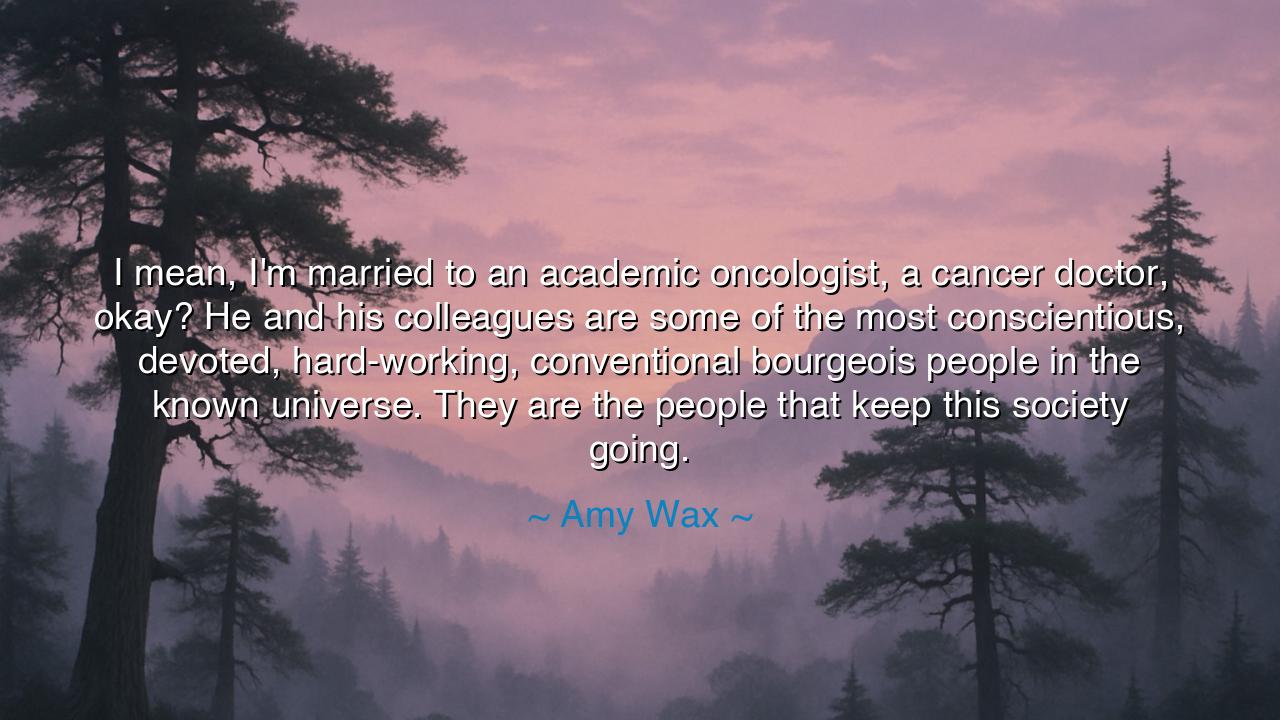
I mean, I'm married to an academic oncologist, a cancer doctor
I mean, I'm married to an academic oncologist, a cancer doctor, okay? He and his colleagues are some of the most conscientious, devoted, hard-working, conventional bourgeois people in the known universe. They are the people that keep this society going.






O children of the earth, listen closely to the words of Amy Wax, who, in her reflections on the role of the individual in society, speaks of the quiet, yet profound contributions that uphold the very structure of our world. She said: "I mean, I'm married to an academic oncologist, a cancer doctor, okay? He and his colleagues are some of the most conscientious, devoted, hard-working, conventional bourgeois people in the known universe. They are the people that keep this society going." These words carry with them a great truth—that the true strength of a society lies not in the loud, but in the quiet dedication of those who, though often unseen, labor tirelessly for the good of the many.
In every era, there have been those who have been quick to glorify the warrior, the leader, the one who stands in the forefront, making bold declarations and sweeping changes. Yet, as the ancients understood, the foundation of any civilization is not built on the fleeting actions of a few, but on the steady, unwavering commitment of those who work in the shadows, those who serve not for glory, but for the common good. Just as the Greek philosophers spoke of the need for balance in society, so too do we see that a healthy society requires not only visionaries, but also those who dedicate their lives to the service of others, tending to the small things that make life possible.
Think of the ancient farmers, whose toil in the fields allowed the great cities to flourish. They were not celebrated in the courts of kings, nor lauded in the great epics that told the tales of warriors and rulers. And yet, it was through their labor—through the cultivation of the land—that the civilization itself thrived. The healers, too, have long been the backbone of any society. The wise women of old, the doctors, the medics—these were the ones who tended to the sick, bringing healing and comfort to those in need. Their work, though often unseen and uncelebrated, was the lifeblood of their communities. The oncologists and medical professionals of today stand as their modern counterparts—dedicated, conscientious, and often working in the background to ensure the health and survival of society.
In Amy Wax’s words, we see a recognition of these quiet heroes—the doctors, the scientists, the educators, and the workers who, though they may not receive the praise or attention that others do, are the true pillars upon which the edifice of civilization stands. It is easy to overlook them, to focus on the more visible figures who capture the headlines, but the reality is that without the labor and dedication of these individuals, society would collapse. Cancer doctors, like the one to whom Wax refers, are not just healers of the body, but of society itself, providing not only medical care, but hope, stability, and the promise of life.
The ancient wisdom teaches us that a society is not made up of isolated individuals, but of interconnected lives. The work of the bourgeois—the doctors, the teachers, the builders—forms the very fabric of the community. They are the unsung warriors, the ones who fight the invisible battles of illness, poverty, and ignorance, often without recognition or reward. Their work is slow, steady, and essential. Without them, the world would fall into chaos, as there would be no one left to carry out the tasks that keep the wheels of society turning.
Thus, the lesson is clear: true greatness is not always found in the spotlight. It is not always the loud, the grandiose, or the powerful who shape the world. More often, it is the quiet dedication of those who work diligently, humbly, and without fanfare, who carry the weight of society on their shoulders. Amy Wax’s words remind us that we must honor and acknowledge the work of these individuals, for they are the ones who truly keep our world intact. The good society is not built by the rich, the famous, or the powerful, but by those whose hearts are devoted to service, to healing, and to the greater good of all.
Let us then take this wisdom to heart. In our own lives, let us serve where we can, not seeking recognition or reward, but acting out of a deep sense of responsibility to one another. Whether in the field of medicine, education, or community building, let us remember that true greatness is not in the accolades we receive, but in the impact we have on those around us. Let us be the foundation upon which the future is built, just as the quiet, hard-working doctors, farmers, and teachers of the past have done before us. Their labor, though often invisible, is the light that guides us forward.






AAdministratorAdministrator
Welcome, honored guests. Please leave a comment, we will respond soon